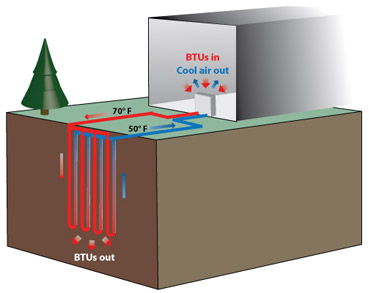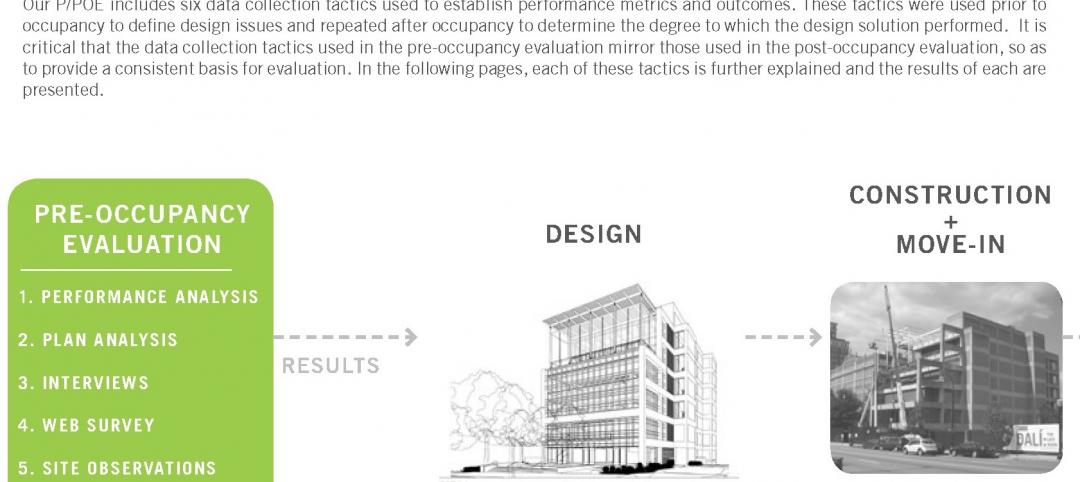Geothermal heat pump (GHP) systems, which harness moderate and constant temperatures just below the Earth’s surface, are being deployed in nearly every region of the world and in residential, commercial, institutional, and industrial environments with great success. Despite recent setbacks in deployments in many parts of the world due to the economic downturn, the future looks bright for the worldwide GHP market.
According to a recent report from Navigant Research, the worldwide installed capacity of GHP systems will grow by nearly 150 percent over the next 7 years, from 52.7 gigawatts-thermal (GWt) to 127.4 GWt.
“The renewable energy policies that led to strong growth in the GHP market in the last decade are still in place, and will drive expansion as the global economy improves,” says Mackinnon Lawrence, principal research analyst with Navigant Research. “Although their overall penetration remains low, GHP installations are gaining traction in both the construction industry and the regulatory environment, and this high-efficiency technology will likely play a larger role in both new build and retrofit projects going forward.”
In some ways, the fortunes of the GHP market are tied to that of the housing market: As the number of housing starts increases, so do the opportunities for installers and engineers of GHP systems to deploy their technology. Yet, a number of factors affect a homeowner’s or residential developer’s decision to deploy GHPs in a project, including quality of construction, construction budget, ease of getting a loan, and importance of green image. Thus, while the rate of housing starts has grown steadily over the last 2 years, the rate of GHP deployments has not kept pace, the study concludes.
The report, “Geothermal Heat Pumps,” analyzes the global market opportunity for geothermal heat pumps, including a comprehensive examination of GHP markets, demand drivers, existing and emerging technologies, the public policy and regulatory environment, and key industry players. Market forecasts, segmented by geography and market segment, extend through 2020 and include examinations of market dynamics in all key regions worldwide. An Executive Summary of the report is available for free download on the Navigant Research website.
About Navigant Research
Navigant Research, the dedicated research arm of Navigant, provides market research and benchmarking services for rapidly changing and often highly regulated industries. In the energy sector, Navigant Research focuses on in-depth analysis and reporting about global clean technology markets. The team’s research methodology combines supply-side industry analysis, end-user primary research and demand assessment, and deep examination of technology trends to provide a comprehensive view of the Smart Energy, Smart Utilities, Smart Transportation, Smart Industry, and Smart Buildings sectors. Additional information about Navigant Research can be found at www.navigantresearch.com.
About Navigant
Navigant is a specialized, global expert services firm dedicated to assisting clients in creating and protecting value in the face of critical business risks and opportunities. Through senior level engagement with clients, Navigant professionals combine technical expertise in Disputes and Investigations, Economics, Financial Advisory and Management Consulting, with business pragmatism in the highly regulated Construction, Energy, Financial Services and Healthcare industries to support clients in addressing their most critical business needs. More information about Navigant can be found at www.navigant.com.
Related Stories
| Sep 22, 2014
4 keys to effective post-occupancy evaluations
Perkins+Will's Janice Barnes covers the four steps that designers should take to create POEs that provide design direction and measure design effectiveness.
| Sep 22, 2014
Sound selections: 12 great choices for ceilings and acoustical walls
From metal mesh panels to concealed-suspension ceilings, here's our roundup of the latest acoustical ceiling and wall products.
| Sep 15, 2014
Ranked: Top international AEC firms [2014 Giants 300 Report]
Parsons Brinckerhoff, Gensler, and Jacobs top BD+C's rankings of U.S.-based design and construction firms with the most revenue from international projects, as reported in the 2014 Giants 300 Report.
| Sep 9, 2014
Using Facebook to transform workplace design
As part of our ongoing studies of how building design influences human behavior in today’s social media-driven world, HOK’s workplace strategists had an idea: Leverage the power of social media to collect data about how people feel about their workplaces and the type of spaces they need to succeed.
| Sep 8, 2014
First Look: Foster + Partners, Fernando Romero win competition for Mexico City's newest international airport
Designed to be the world’s most sustainable airport, the plan uses a single, compact terminal scheme in lieu of a cluster of buildings, offering shorter walking distances and fewer level changes, and eliminating the need for trains and tunnels.
| Sep 3, 2014
New designation launched to streamline LEED review process
The LEED Proven Provider designation is designed to minimize the need for additional work during the project review process.
| Sep 2, 2014
Ranked: Top green building sector AEC firms [2014 Giants 300 Report]
AECOM, Gensler, and Turner top BD+C's rankings of the nation's largest green design and construction firms.
| Sep 1, 2014
Ranked: Top federal government sector AEC firms [2014 Giants 300 Report]
Clark Group, Fluor, and HOK top BD+C's rankings of the nation's largest federal government design and construction firms, as reported in the 2014 Giants 300 Report.
| Aug 19, 2014
HOK to acquire 360 Architecture
Expected to be finalized by the end of October, the acquisition of 360 Architecture will provide immediate benefits to both firms’ clients worldwide as HOK re-enters the sports and entertainment market.
| Aug 11, 2014
Air Terminal Sector Giants: Morphing TSA procedures shape terminal design [2014 Giants 300 Report]
The recent evolution of airport terminals has been prompted largely by different patterns of passenger behavior in a post-9/11 world, according to BD+C's 2014 Giants 300 Report.

















